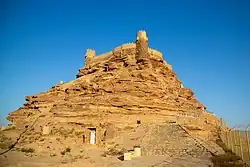قلعة تاروت | |
 The north part of the castle, September 2016 | |
| Location | Tarout Island, Saudi Arabia |
|---|---|
| History | |
| Founded | 5th millennium BCE-16th century AD |
| Site notes | |
| Condition | Partly destroyed |
Fort Tarout or Tarout Castle (Arabic: قلعة تاروت) is a historic castle located at the top of a hill in the center of Tarout Island, eastern Saudi Arabia. The base at which the castle was built on goes back to 5000 BC.[1] The castle itself was built on the base of an old Phoenician temple, that was dedicated to Astarte, during the Uyunid Emirate (1076–1253). Other researchers believe that it was built in the 16th century between 1515 and 1520 AD during Portuguese invasion of Pesian gulf and was one of their dereferense point after they restored it on 24 March 1544.[2]
Tarout Castle was originally built during the rise of Dilmun civilization and dedicated to the worship of Mesopotamian goddesses, such as Ashtar, which the name Tarout is derived from. The fort dates back to 5000 years ago, with many inscriptions found in it as well as the Mesopotamian God's statues. Invaded by the Portuguese in the 16th century, they took it as a military base, and was later left in ruins. It has an oval-shaped irregular inner plan that has a total area of no more than 600 square metres (6,500 sq ft), surrounded by a wide wall constructed with sea mud, gypsum, and Fourosh rocks. It had 4 towers in total and one was destroyed during a battle.[3]
The fort is located on a hill in the centre of Tarout Island; the hill is the highest feature on the island. There used to be a spring beside the castle called "Ayyin Aloudda" (the old spring) which was the main source of water for the Island.
See also
References
- ↑ هاشم, رصد: د. عثمان عبده (2007-05-17). "تاروت.. كنز يحتفظ بأسرارخمسة آلاف عام". Okaz (in Arabic). Archived from the original on 2017-08-23. Retrieved 2017-08-23.
- ↑ الدرورة, علي (2001). تاريخ الاحتلال البرتغالي للقطيف 1521-1572م. أبو ظبي: المجمع الثقافي.
- ↑ الأنصاري، جلال بن خالد الهارون - 24 / 3 / 2011م العدد (60) Archived 2017-10-16 at the Wayback Machine - مجلة الواحة
